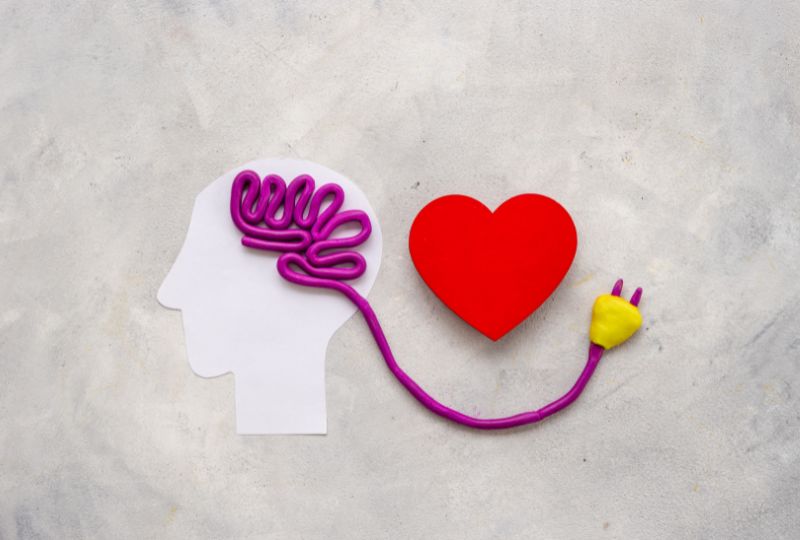Emotional intelligence (EI) plays a crucial role in mental health, relationships, and overall well-being. It helps you understand, manage, and express emotions effectively, leading to better decision-making, reduced stress, and improved social connections.
People with high emotional intelligence tend to be happier, more resilient, and better at handling challenges. The good news? Emotional intelligence is a skill you can develop and strengthen over time.
In this guide, you’ll learn how emotional intelligence affects well-being and practical ways to improve it for a healthier, more balanced life.
What Is Emotional Intelligence (EI)?
Emotional intelligence is the ability to:
✅ Recognize and understand emotions → Both in yourself and others.
✅ Regulate emotions effectively → Stay calm under pressure and manage stress.
✅ Express emotions in a healthy way → Communicate thoughts and feelings openly.
✅ Empathize with others → Understand and relate to different perspectives.
✅ Build strong relationships → Navigate social interactions with confidence.
Now, let’s explore why emotional intelligence is essential for well-being.
1. Emotional Intelligence Helps Manage Stress and Anxiety
When you can identify and regulate emotions, you respond to stress in a healthy, constructive way instead of feeling overwhelmed.
✅ How Emotional Intelligence Reduces Stress:
- Helps you recognize triggers and respond calmly.
- Encourages deep breathing and mindfulness to stay present.
- Prevents overreacting to challenges by maintaining emotional balance.
🔹 Try This:
- When feeling stressed, pause and ask: “What emotion am I experiencing right now?”
- Practice diaphragmatic breathing to calm your nervous system.
✅ Why It Works: Increases self-awareness and emotional control, making stress easier to handle.
2. Emotional Intelligence Strengthens Relationships
Understanding and managing emotions improves communication, empathy, and connection with others.
✅ How EI Enhances Relationships:
- Encourages active listening and open conversations.
- Reduces misunderstandings and conflicts.
- Strengthens trust and emotional connection.
🔹 Try This:
- When having a conversation, focus fully on the speaker without distractions.
- Before reacting emotionally, pause and ask: “How would I feel in their position?”
✅ Why It Works: Empathy and emotional awareness create deeper, more meaningful relationships.
3. Emotional Intelligence Improves Self-Confidence and Motivation
When you understand your emotions and reactions, you gain more control over your actions and decisions.
✅ How EI Boosts Confidence:
- Helps you set and achieve personal goals without self-doubt.
- Encourages self-compassion instead of negative self-talk.
- Develops a growth mindset, seeing challenges as learning opportunities.
🔹 Try This:
- Replace negative thoughts with affirmations like: “I am capable and resilient.”
- Celebrate small achievements, even on difficult days.
✅ Why It Works: Emotional intelligence helps shift your mindset from self-doubt to self-belief.
Developing emotional intelligence goes hand in hand with practicing self-compassion, as being kind to yourself helps reinforce confidence and resilience during emotional ups and downs.
4. Emotional Intelligence Enhances Decision-Making
People with high EI make better choices because they can separate emotions from logic.
✅ How EI Improves Decision-Making:
- Helps control impulsive reactions.
- Encourages logical thinking over emotional responses.
- Increases awareness of long-term consequences.
🔹 Try This:
- Before making an important decision, ask: “Is this emotion-based, or is it the best logical choice?”
- Take a moment to breathe before reacting in stressful situations.
✅ Why It Works: Balanced emotions lead to better, more thoughtful decisions.
5. Emotional Intelligence Promotes Emotional Resilience
Life is full of challenges, but emotionally intelligent people handle setbacks with resilience.
✅ How EI Helps with Emotional Resilience:
- Encourages self-reflection and problem-solving.
- Helps manage negative emotions without suppressing them.
- Promotes acceptance and adaptability in difficult times.
🔹 Try This:
- When facing a challenge, reframe your thinking: “What can I learn from this?”
- Practice journaling to process emotions and gain perspective.
✅ Why It Works: A resilient mindset reduces stress and promotes emotional well-being.
You can also explore emotional healing techniques like EFT and Ho’oponopono to support emotional resilience and gently process lingering stress or emotional blocks.
How to Improve Emotional Intelligence for Better Well-Being
🔹 Develop self-awareness → Recognize and label your emotions.
🔹 Practice emotional regulation → Respond thoughtfully, not react impulsively.
🔹 Improve empathy → Understand the feelings of others.
🔹 Communicate effectively → Express emotions openly and respectfully.
🔹 Build positive habits → Meditate, journal, and reflect on emotions daily.
Final Thoughts
Emotional intelligence affects every aspect of life, from personal well-being to relationships and decision-making. By improving self-awareness, empathy, and emotional regulation, you can build a more balanced, fulfilling, and happy life.
Which emotional intelligence skill will you focus on developing this week? 😊
